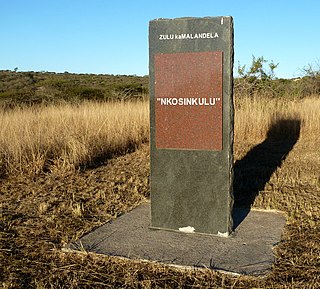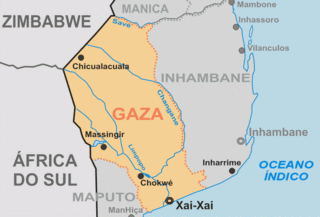The Zulu are a Bantu ethnic group of Southern Africa and the largest ethnic group in South Africa, with an estimated 10–12 million people living mainly in the province of KwaZulu-Natal. Small numbers also live in Zimbabwe, Zambia, Tanzania and Mozambique.
Nguni stick-fighting is a martial art traditionally practiced by teenage Nguni herdboys in South Africa. Each combatant is armed with two long sticks, one of which is used for defense and the other for offense. Little armor is used.

Southern Ndebele, also known as Transvaal Ndebele or South Ndebele, is an African language belonging to the Nguni group of Bantu languages, spoken by the Ndebele people of South Africa.

Zulu kaMalandela (1627–1709), son of Malandela, was the founder and chief of the Zulu clan which came from the Nguni people. The Zulus and the Qwabes come from the Ngunis, when the King of the Ngunis Malandela died he divided the Kingdom into two clans, The Qwabes and the Zulus. In the Zulu language, Zulu means Sky.

The Swazi or Swati are a Bantu ethnic group of Southern Africa, predominantly inhabiting modern Eswatini and South Africa's Mpumalanga province. The Swati are part of the Nguni family that can be archaeologically traced in East Africa where the same tradition, beliefs and cultural practices are found. The Swati share a unique experience, culture and Royal lineage. This lineage is exclusive to the inhabitants of Eswatini, even though there have been more Swazi people that have moved to South Africa and the United Kingdom in the 20th century. The original inhabitants of Eswatini no longer reside in Eswatini as a majority population while some remain in the land. The Swazi people and the Kingdom of Eswatini today are named after Mswati II, who became king in 1839 after the death of his father King Sobhuza who strategically defeated the British who occupied Swaziland. The Kingdom of Swaziland was a region occupied by the San people of Southern Africa and the current Swazis came in from North Eastern regions through to Mozambique and eventually Swaziland in the 15th century. Mixtures with the San people and other Nguni tribes occurred. Their royal lineage can be traced to a chief named Dlamini I; this is still the royal clan name. About three-quarters of the clan groups are Nguni; the remainder are Sotho, Tsonga, others North East African and San descendants. These groups have intermarried freely. There are slight differences among Swazis as a nation with varying features and skin tones yet Swazi identity extends to all those with allegiance to the twin monarchs Ingwenyama "the Lion" and Indlovukati "the She-Elephant". The dominant Swati language and culture are factors that unify Swazis as a nation since there is no other language spoken except for English.

The Ndwandwe are a Bantu Nguni-speaking people who populate sections of southern Africa.
The Ndau are an ethnic group which inhabits the Zambezi valley, in central Mozambique all the way to the coast, in central Malawi, and eastern Zimbabwe, south of Chipinge and Chimanimani. The Ndau people identify with a lion as their totem. The name "Ndau" itself means "lion" in the Ndau and Shona languages. The three largest Ndau groups are the Magova; the Mashanga; the Vatomboti, and the Madanda.
Phuthi (Síphùthì) is a Nguni Bantu language spoken in southern Lesotho and areas in South Africa adjacent to the same border. The closest substantial living relative of Phuthi is Swati, spoken in Swaziland and the Mpumalanga province of South Africa. Although there is no contemporary sociocultural or political contact, Phuthi is linguistically part of a historic dialect continuum with Swati. Phuthi is heavily influenced by the surrounding Sesotho and Xhosa languages, but retains a distinct core of lexicon and grammar not found in either Xhosa or Sesotho, and found only partly in Swati to the north.
In Nguni legend, Mnguni was the founder of the Nguni nation in southern Africa. Zulu are a sub nation in the Nguni nation. Mnguni's name derives from the word Nguni, the name for the major ethnicity in South Africa. It includes the Zulu, Bhaca, Qwabe, Qulusi and Xhosas, among others. Most of the different Nguni nations trace their lineage to Mnguni, the king of the unified Nguni nation in South Africa. He is said to have come from the northeast between the years 1400-1600.
Black people from South Africa were at times officially called Bantu by the apartheid regime. The term Bantu is derived from the word for "people" common to many of the Bantu languages. The Oxford Dictionary of South African English describes its contemporary usage in a racial context as "obsolescent and offensive" because of its strong association with white minority rule and the apartheid system. However, Bantu is used without pejorative connotations in other parts of Africa.

The Mthethwa Paramountcy, sometimes referred to as the Mtetwa or Mthethwa Empire, was a Southern African state that arose in the 18th century south of Delagoa Bay and inland in eastern southern Africa. "Mthethwa" means "the one who rules". According to Muzi Mthethwa (1995), the Mthethwas are descended from the Nguni tribes of northern Natal and the Lubombo Mountains, whose modern identity dates back some 700 years. They are among the first Thonga-Nguni groups who left the Great Lakes in Central Africa between 200 AD and 1200 AD. On arrival in Southern Africa, they settled around modern-day Swaziland, mainly on the Lubombo Mountains, before leaving in the 17th century to settle in modern-day KwaZulu-Natal, in the Nkandla region. It consisted of roughly 30 Nguni Chiefdoms, lineages, and clans. Unlike its successor, the Zulu Kingdom, the Mthethwa Paramountcy was a confederation. After Zulu prince Sigidi kaSenzagakhona became king, he forged a nearly homogeneous nation with a single king (nkosi).

The Gaza Empire (1824–1895) was an African empire established by the powerful general Soshangane and was located in southeastern Africa in the area of southern Mozambique and southeastern Zimbabwe. The Gaza Empire, at its height in the 1860s, covered all of Mozambique between the Zambezi and Limpopo rivers. It is not to be confused with the Gazankulu Homeland (Bantustan) which was created under the Apartheid system in order to serve as a semi-independent homeland for the Tsonga and Shangaan people in 1971.

Sanga cattle is the collective name for indigenous cattle of sub-Saharan Africa. They are sometimes identified as a subspecies with the scientific name Bos taurus africanus. These cattle originated in East Africa, probably the western shores of Lake Victoria, and have spread up the river Nile, with depictions on Ancient Egyptian murals. Sanga are an intermediate type, probably formed by hybridizing the indigenous humpless cattle with Zebu cattle. However, archaeological evidence indicates this cattle type was domesticated independently in Africa, and bloodlines of taurine and zebu cattle were introduced only within the last few hundred years. Although the timeline for their history is the subject of extensive debate, some authors date the first Sanga cattle to 1600 BC. They are distinguished by having small cervicothoracic humps instead of the high thoracic humps which characterize the Zebu.
Ngoni is a Bantu language of Zambia, Tanzania, Mozambique, and Malawi. It is one of several languages of the Ngoni people, who descend from the Nguni people of southern Africa, and the language is a member of the Nguni subgroup, with the variety spoken in Malawi sometimes referred to as a dialect of Zulu. Other languages spoken by the Ngoni may also be referred to as "Chingoni"; many Ngoni in Malawi, for instance, speak Chewa, and other Ngoni speak Tumbuka or Nsenga.
Lala is a Bantu language of South Africa, claimed to be extinct in some sources. As of 1999, however, there were still a number of communities of speakers in the coastal regions of the KwaZulu-Natal province of South Africa. Although it is a Tekela Nguni language, for sociological reasons it is often considered a dialect of Zulu, whereas it differs quite markedly in phonology and to a degree in morphology, and with a large portion of its lexicon derived from Xhosa and the IsiZansi Tekela variety of the lower South Coast.
Nhlangwini (Hlangwane) is a Bantu language of South Africa. It is located along the border between Xhosa and Zulu, but is more closely related to Swazi.






